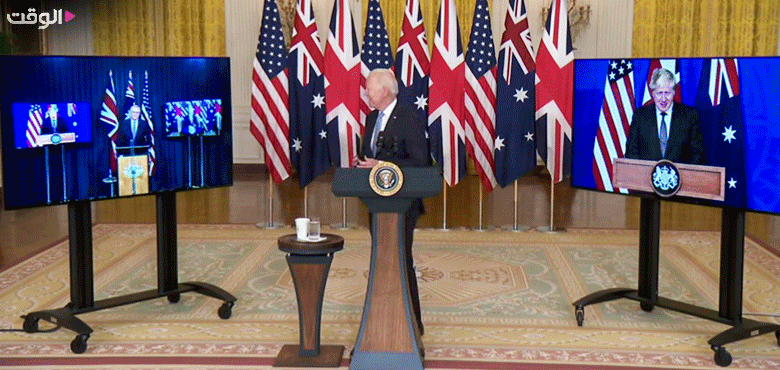Alwaght- The union of the countries on both sides of the Atlantic for decades has been the epitome of cooperation and coordination of the capitalist and liberal nations of the West. In the years following the WWII, the European states, witnessed economic, social, and military collapse as a result of the devastating wars, accepted an official American mandate, forming the Atlantic led by Washington. During the period, Bretton Woods financial system and NATO represented the ultimate American-European unity, ushering in what is called Atlanticism.
This alliance grew to the highest possible level during the height of the Cold War, and in a way the US became a guarantor of European security. But post-Cold War and Soviet Union Collapse that represented the Socialist bloc, the unity of the Atlantic countries headed to decline and began to end since last decade.
In the middle of the weakening alliance, an American, British, and Australian security pact, dubbed AUKUS, to help Canberra develop and deploy nuclear-powered submarines sounded death knell of American-European unity as deep division gained publicity.
AUKUS pact and end of traditional Washington-Paris alliance
There is no doubt that AUKUS pact death the final blow to the comprehensive Atlantic alliance and seems to be a end point of the European trust in the US. The pact is aimed at "advancing peace and stability in Indo-Pacific region. According to pact that was signed on September 15, a number of submarines with nuclear-powered engines, and not nuclear-armed, will be delivered to Australia.
A few hours after the pact, European countries highlighted the need for independence of policy and decisions making from Washington. This determined itself in the French move to recall its ambassadors to the US and Australia in protest. Paris read the tripartite agreement as a stab in its back. Under the pact, Paris lost a signed agreement with Canberra to supply worth of nearly $90 billion nuclear-powered submarines to Australia. Australian officials decided to cancel the lucrative "contract of the century" with France and replace it with American arms.
Reacting furiously, France called the pact unacceptable and treasonous. This is the first time France has recalled its ambassadors from the US and Australia. Even more important is the fact that the US-France alliance dates back to the American war of independence, and calling ambassadors between the two allies is very unusual and unbelievable.
Europe eyeing independence; late but serious
Ambassadors recall by Paris should not be seen as just the end of an alliance or disagreement between two members of the Security Council or a dispute between two former allies. Rather, France's move is a manifestation of Europe's new decision to move to independence and departure from trust in Washington. The inter-Atlanticism division began with the invasion of Iraq during the presidency of George W. Bush, during which France and Germany, unlike Britain, refused to side with the US. President Barack Obama's policy of consensus somehow improved the frayed relationship with Europe. Under Donald Trump, the division went to new heights.
It was under Trump that the rift among NATO member states became visible to the international community like open wounds. NATO's European members have come to believe that the US can no longer be considered Europe's umbrella and shield, as it was during the Cold War and so the Europeans themselves should seek a way for self-protection. It was at this time that the leaders of France and Germany in 2019 spoke of the need to establish a "European Security Council" represented by a European army. But in the meantime the important point was that the issue of forming a European army outside NATO was not an overnight plan designed after Donald Trump came to power, and in all the years since the Cold War, the Europeans have been gradually distancing themselves from the Washington and had obviously understood the need to separate ways from the Americans in security crises.
"Europe must defend its security," French President Emmanuel Macron has repeatedly said. In fact, from Macron's point of view, Europe must achieve "strategic autonomy" in the near future. The same view is held by Chancellor Angela Merkel of Germany. In 2020, France and Germany as two top military and economic powers of the European Union proposed forming "European Joint Defense Force." Merkel's likeliest successor Armin Laschet in a televised debate said "we must strengthen Europe so that we will never again hand it over to the Americans."
The European countries which had seen rays of hope under Biden for a resurgence of Atlanticism now seem to have come to believe, after AUKUS pact, that it is time for a "strategic shift" and that it would be a strategic mistake to rely on Washington for security. Just a few hours after new security pact was unveiled, the defense ministers drafted joint defense force plan for discussion in the next EU leaders meeting. Even European diplomats stressed that the formation of a joint military force would be on the EU's agenda when France, the with EU's most powerful military force, takes over the six-month presidency of the bloc. This is a clear sign for collapse of trust in Washington.
Withdrawal from Afghanistan and finalization of European independence from the US
For a more precious look at the end of the European trust in the US and European security independence, we need to focus on the American withdrawal as an important factor. Two decades of European cooperation with the US so-called counterterrorism plan in Afghanistan, ended in an unilateral withdrawal of Washington without consulting the EU and taking into account European interests and handing over the country to a group that they have toppled 20 years ago. In particular, due to the proximity of the EU geographical borders to Afghanistan, security threats, including the spread of terrorism in Afghanistan, as well as the possibility of a refugee crisis, threaten European countries more seriously now. Top European leaders, including Josep Borrell, said the hurried European exit from Afghanistan showed the lack of European independence and dependence of the bloc on the US. He called for an independent European force.
Now it seems that the European military independence is taking its final steps towards emergence. Last week, the aftershocks of difference over the way of exit from Afghanistan showed themselves and the EU defense ministers agreed on designing a joint military force before March 2022. The European Parliament passed the plan with 536 affirmative votes. The EU should invest in military intelligence, surveillance and reconnaissance, and strategic air transport, the draft says.
Approving the draft plan in addition to crafting a roadmap for European defense independence sent a highly important message on end of difference inside the EU on whether to stay reliant on Washington or stand on own feet militarily. Until recently, Germany was more conservative than France about taking steps towards defense independence, and when French President Emmanuel Macron described NATO as "brain-dead", Berlin officials reacted with criticism. Germany's Defense Minister Annegret Kramp-Karrenbauer told a German newspaper that she plans to propose European rapid response military force by end of October. All these suggest that the Atlantic inclusive alliance is heading to death and in the next months Europeans will step up efforts for independence from the US.



























